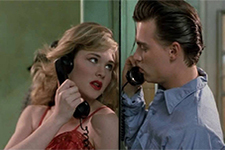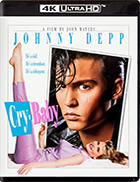Cry-Baby (4K UHD)
|  Near the end of the 1980s, underground cult director John Waters—the “Sultan of Sleaze,” the “Baron of Bad Taste,” the “Pope of Trash”—took a calculated turn toward the middle of the road. Starting with Hairspray (1988), a PG-rated comedy about the racial integration of a local Baltimore TV dance show that was later spun into a hit Broadway musical, Waters tempered his more radical inclinations, a logical and defensible career move given that the taboos he smashed and the cultural boundaries he crossed in the ’60s and ’70s were becoming more and more mainstream as the years passed. As Waters told the crowd at the United States Film Festival in Park City, Utah, in 1988, the only thing left for him to do to shock people was to make a PG-rated movie. And, as Waters has noted elsewhere, his later movies became a new version of his infamous “good bad taste”—“a kinder, gentler approach.” Hairspray was a hit both theatrically and on home video, and Waters, the man who once ended a film with his heroine eating dog shit, found himself in a most curious position: major Hollywood studios were clamoring to work with him, offering him budgets far beyond what he had previously worked with, even on Hairspray, which was produced by New Line Cinema in its post-Nightmare on Elm Street heyday for $2.7 million (by contrast, his first “aboveground” film, 1981’s Polyester, cost only $300,000, which was more than all of his previous films combined). With his newfound clout, he signed a deal with Imagine Entertainment (you know, the production company co-founded by Ron Howard) and Universal to make Cry-Baby, his loving ode to ’50s Elvis musicals and juvenile-delinquent dramas. And just like that, he was working with a union crew, wielding an $11 million budget, and giving directions to Johnny Depp, then a teen idol best known for the television series 21 Jump Street, in his first starring role. Waters had never worked with a bona-fide Hollywood star before (the closest he had come was directing Tab Hunter in Polyester), but he clearly understood how to incorporate Depp’s unique good looks and screen charisma into his warped cinematic worldview. Of course, the cast and crew were packed with Dreamlanders—the oddball collective of creative outcasts with whom Waters had been collaborating since his days of working out of his Baltimore bedroom in the 1960s. A number of them had passed away, including actors David Lochary (1977), Edith Massey (1984), and Cookie Mueller (1989). Waters had most recently lost Divine (née Glenn Milstead), who had played the lead in virtually all of his films up until then, including Hairspray. However, all of his other collaborators were on-board, including casting director Pat Moran, production designer Vincent Peranio, and actors Mink Stole, Mary Vivian Pierce, and Susan Lowe. Set in Waters’s beloved Baltimore in the mid-1950s (the era of his own adolescence), Cry-Baby tackles familiar social territory with its version of a forbidden cross-gang romance. In this case, it is the Squares and the Drapes, which sound like made-up gangs except that Waters has claimed up and down that they were real and that anyone who grew up in Baltimore in the ’50s and ’60s would have identified with one or the other. The Drapes are defined primarily as rough-and-tumble rock ’n’ roll-pioneering hillbillies, while the literally named Squares are the straight-laced, well-groomed boys and girls most readily associated with the sanitized American family sphere of the ’50s. Of course, rarely is anything “normal” in Waters’s films, and here he sees the Squares as being just as delinquent as the Drapes while being clothed in the protection of “legitimacy” (it is similar, in this regard, to S.E. Hinton’s novel The Outsiders and Francis Ford Coppola’s 1983 film adaptation, which pitted greasers against socs, the latter of whom looked straight, but were even more violent and dangerous). Thus, the large brawl at the center of the film is instigated by the Squares when they invade the Drapes’ territory and commit acts of vandalism by pouring sugar into the gas tanks of the Drapes’ cars, spray-painting them, and setting a motorcycle on fire. The titular hero, Cry-Baby Walker (Depp), is a James Dean-esque sensitive soul in a bad boy’s body and clothes, which Depp plays to the hilt. Depp and Waters both got what they wanted and needed in his casting: Depp wanted to break free of vapid teen idolatry by sending up his own status, while Waters got to work with a true star who could bring genuine wattage to his adolescent heart-throb hero. Because Cry-Baby has soul beneath his black leather and tattoos, he falls hard for Allison Vernon-Williams (Amy Locane), the grand-daughter of Mrs. Vernon-Williams (Polly Bergen), the extremely uptight head of the town’s elite social club. Alison is all but betrothed to her Square boyfriend, Baldwin (Stephen Mailer), but she is clearly smitten with Cry-Baby, which we see in the wonderful opening sequence in which all the students are lined up to get their polio vaccines. Waters uses this Eisenhower-era medical ritual as an opportunity to introduce all the major characters, establish the tensions between the Drapes and the Squares, and immediately start the sparks flying between Cry-Baby and Allison, who steal shy glances at each other while getting the needle in their arms, all without any dialogue. Because this is a Waters movie, it is all about Squares finding their inner Drape (Allison’s first line of dialogue is “I’m so tired of being good”), thus it is no surprise that not only does Allison embrace the ways of the bad girl, but so does Mrs. Vernon-Williams and the uptight local judge (Robert Walsh) who at one point sentences Cry-Baby to prison for “rampant juvenile delinquency” along with his pregnant sister Pepper (Ricki Lake) and his friends Milton (Darren E. Burrows), Hatchet-Face (Kim McGuire), and Wanda (Traci Lords). Cry-Baby is Waters’s one true musical, the only one in which characters break out into diegetic song and dance (many people mis-remember Hairspray as a musical, but it isn’t). The soundtrack is replete with ’50s-era tunes, including the title track (a cover of the Bonnie Sisters’ 1956 one-hit wonder, which Waters claims was the first album he ever bought), although the characters also sing songs newly penned by a veritable stable of composers who draw deep from the various wells of rockabilly, blues, doo-wop, and crooning ballads. Depp and Locane are lip-synching (James Intveld and Rachel Sweet provided their vocals), but they are all in at every moment, infusing each musical sequence with genuine energy that borders on camp, but never tips over. In this regard, Cry-Baby is the “straightest” movie Waters ever made in terms of the characters having and expressing real emotions. Sure, he packs the film with stunt casting, including Warhol mainstay Joe Dallesandro as a fire-and-brimstone preacher, punk rocker Iggy Pop as the patriarch and Susan Tyrrell as the matriarch of Cry-Baby’s clan, David Nelson of Ozzie & Harriet as Wanda’s bus-driving father and the notorious heiress-turned-bank robber Patricia Hearst as her mother, and, of course, former porn star Traci Lords as Wanda. Yet, for all the irony and camp, Waters seems to be going after real human connection, something that was all but absent from his previous films. The French kiss scene between Cry-Baby and Allison certainly parodies the conventions of teen romance (the progressively more ludicrous tongue gymnastics being performed by various characters is classic Waters), but it also works with real sensuality (sex scenes in most Waters films are either gross, absurd, or both). The overall tone may be comedic, but Waters wants the romance to be real, which is ultimately what makes Cry-Baby work so well.
Copyright © 2024 James Kendrick Thoughts? E-mail James Kendrick All images copyright © Kino Lorber | |||||||||||||||||||||||||||||
Overall Rating: 


 (3.5)
(3.5)


